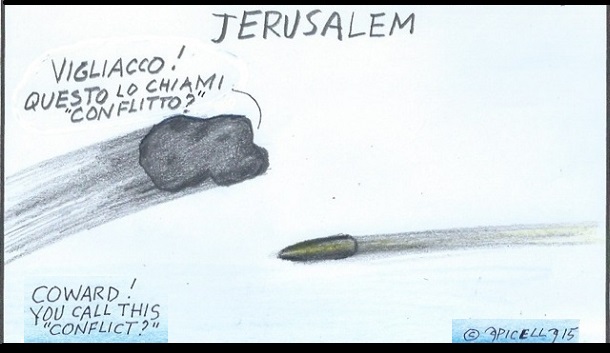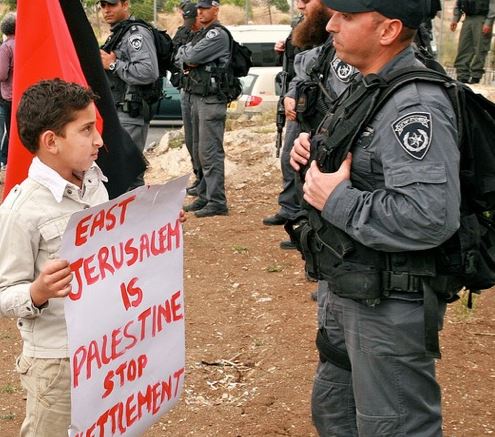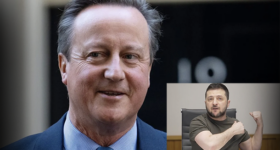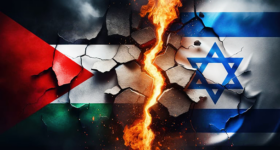
Illustration by Enzo Apicella (2015)
Maureen Clare Murphy
Electronic Intifada
Israel’s most powerful allies will never succeed in their aim of Palestinian surrender. Yet they continue to empower Israel and prolong Palestinian pain in their grotesque treatment of an anti-colonial struggle for liberation as a conflict between two equal parties to be managed seemingly in perpetuity.
One of the cruelest aspects of this approach is the maintenance of the air, land and sea blockade on Gaza that has been imposed by Israel with the help of Egypt since 2007.
The siege has kept Gaza teetering on the brink of collapse and made life miserable and precarious for its population of more than two million Palestinians.
The International Committee of the Red Cross affirmed more than a decade ago that the siege on Gaza constitutes a war crime of collective punishment.
 Yet there is no serious international effort to bring it to an end. World powers appear content for the siege to become as permanent as Israel’s military occupation as a whole.
Yet there is no serious international effort to bring it to an end. World powers appear content for the siege to become as permanent as Israel’s military occupation as a whole.
The so-called Quartet and the states and bodies it represents – the United Nations, United States, European Union and Russia – made no demand on Israel to lift the siege after an unconditional ceasefire ended 11 days of bombing and terrorization of the coastal enclave last month.
Neither did the UN Security Council.
Instead, these powers fell back on well-worn calls for a bilateral two-state solution, calls that they have been repeating ad nauseum since the mid-1990s following the signing of the Oslo accords by Israel and the Palestine Liberation Organization.
In something of a novel twist, Russia welcomed with the ceasefire Washington’s renewed commitment to a two-state solution following the Trump administration’s ridiculed “Prosperity for Peace” plan.
That plan – informally known as the Deal of the Century – did not feign acknowledgment of Palestinian rights and national aspirations.
Critics said it envisioned a permanent state of military occupation, apartheid and Palestinian suffering.
Which is exactly the de facto situation today, made possible by the peace process charade managed by the Quartet.
Those most committed to this pretense stick close to the script: “both sides” bear equal responsibility for maintaining a ceasefire and relative calm, ignoring the essential relationship of colonization between Israel and the Palestinian people whose land it covets.
The situation is delicate and the ceasefire remains fragile. All actors should refrain from unilateral steps and provocations, exercise restraint and facilitate efforts to bring sustainable calm. We all need to work hard for a lasting peace for everyone.
— Sven Koopmans (@EUSR_Koopmans) June 8, 2021
The cessation of hostilities is fragile. I urge both sides to refrain from unilateral steps and provocations, exercise restraint and allow for the necessary work to solidify the ceasefire.
— Tor Wennesland (@TWennesland) June 7, 2021
Sidelining Hamas
Though Israel has a new government, there is absolutely no reason to expect its longstanding policies towards Palestinians, and Gaza in particular, to change.
The managers of the peace process charade defaulted to envisioning a return to the pre-escalation status quo in Gaza before and after the ceasefire.
Tor Wennesland, the UN secretary-general’s Middle East envoy, omitted any mention of the siege during his briefing to the Security Council in late May.
He did say that “Palestinian national unity and the return of a legitimate Palestinian Government to Gaza is [sic] needed to move forward sustainably.”
This means the continued sidelining of Hamas, which governs Gaza’s internal affairs and leads the armed resistance there, in favor of the Palestinian Authority, which serves as an enforcement arm of the Israeli occupation by stamping out Palestinian resistance against it.
Antony Blinken, the US secretary of state, said that “if we do this right, reconstruction and then relief for the people of Gaza — far from empowering Hamas — has the potential to undermine it.”
Israel also sees opportunities to advance its interests by imposing political conditions on humanitarian aid.
Its foreign ministry has suggested that it would use access to aid as leverage against the International Criminal Court’s investigation of war crimes in the West Bank and Gaza…
Continue this story at Electronic Intifada
READ MORE PALESTINE NEWS AT: 21st Century Wire Palestine Files
PLEASE HELP SUPPORT OUR INDEPENDENT MEDIA PLATFORM HERE













